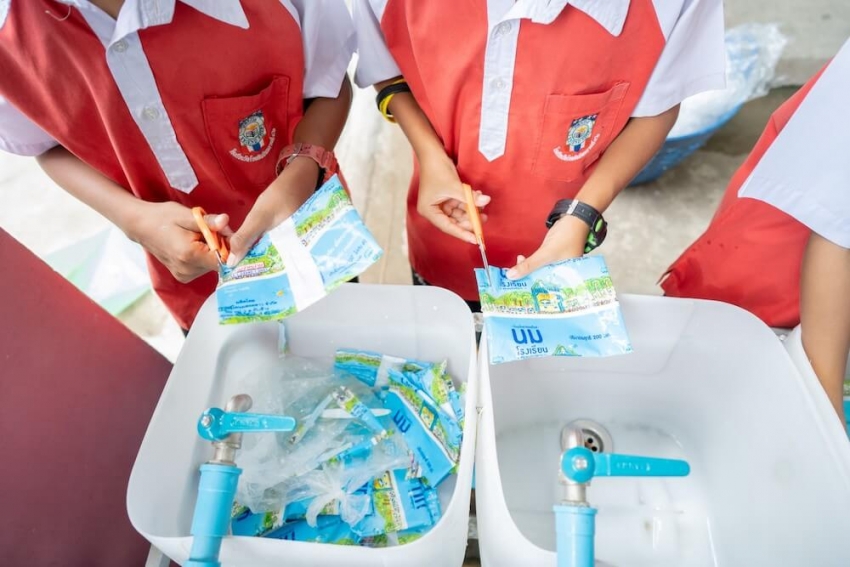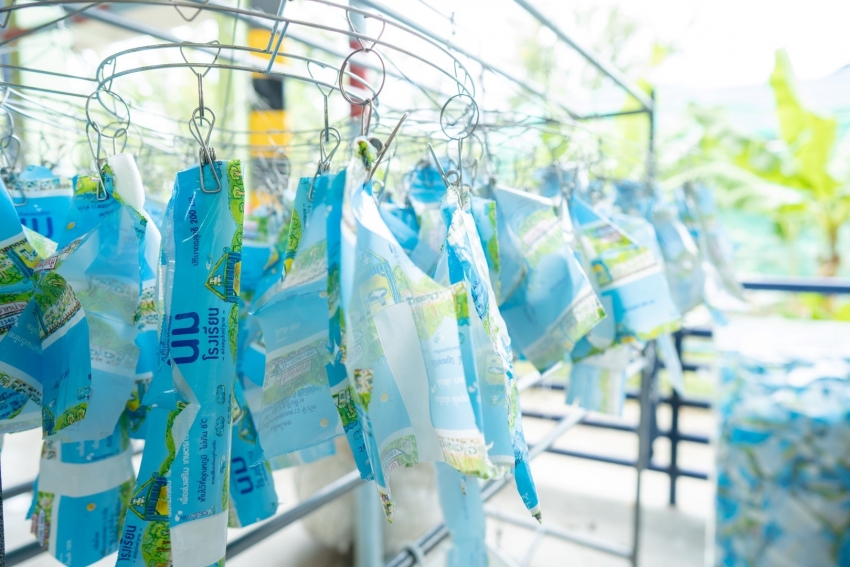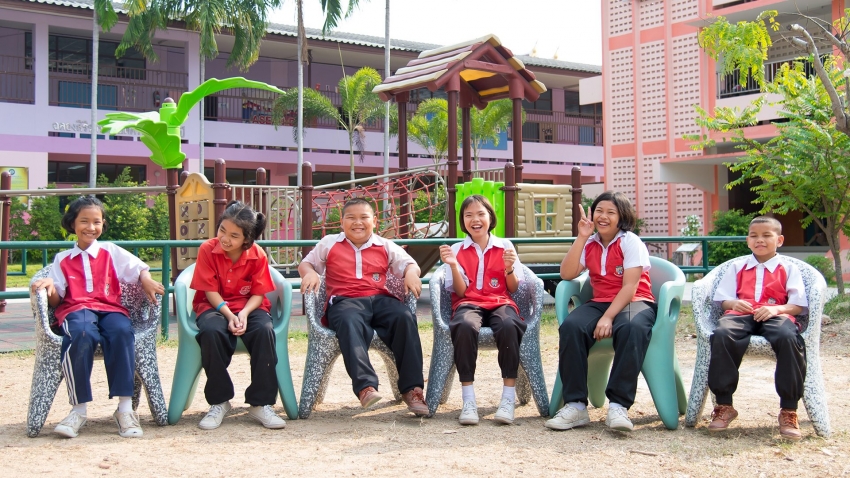SCG’s conviction in the concept of circular economy, which places importance in optimizing usage, sorting waste, and reusing resources, has resulted in the Bang Sue Model, a pilot program by SCG to cultivate a circular economy mindset in employees through three habits #resourcemaximization, #correctsorting, and #properdisposal in order to reduce waste generation, encourage proper waste disposal, and increase the reusability of waste materials.
SCG’s circular economy concept was put in practice with SCG’s Waste-Free Community, a waste management program implemented in Rayong since 2019 and aimed at fostering collaboration among houses, temples, and schools, which are the foundations of the community, along with the community waste bank, so that each sector is able to execute sustainable waste management. Wat Khod Hin Mittraphap 42 School is a stellar example of success in this endeavor.
Collaboration for a Sustainable Solution
The Thai government’s School Milk Program was established during the fiscal year of 1992 as a measure against malnutrition in children by imposing the policy that schoolchildren drink one bag of pasteurized milk daily for a minimum of 200 days per year. This led to the accumulation of over 1,288,891,600 milk pouches, or 3,532 tons of waste, nationally. Wat Khod Hin Mittraphap 42 School also encountered this problem. In the past, these milk pouches, made from LLDPE plastic, turned into waste destined for landfills. Oftentimes, discarded milk pouches remained for extended periods of time at in-school waste sites before being processed by the city, leading to two major problems: unpleasant odor from spoiled milk and the spread of bacteria that could potentially be harmful for children and staff at the school.
SCG’s efforts to educate the community on the circular economy focus on maximizing the utility of materials followed by proper disposal in order to increase their reusability. The Company has sought to foster this mindset through the Waste-Free Community Project to provide a sustainable solution for the problem of milk pouch waste effectively and tangibly. Plastic chairs made from recycled milk pouches are the successful outcome of the initiative between SCG and Wat Khod Hin Mittraphap 42 School and a model product of the recycling of mass quantities of post-consumer waste into a useful resource for the school.
Aside from encouraging children to use resources wisely, educating them on proper waste management is also important. Familiarizing children with waste management through items that they interact with on a day to day basis such as milk pouches helps make this concept more concrete. The students are able to evolve their approach to waste management from mere proper disposal to integrating the process of cleaning and drying the pouches and subsequently collecting them for use in the production of recycled plastic chairs.
From Expertise to Tangible Educational Outcomes
SCG, the largest integrated petrochemical company in Thailand and an industry leader in Asia, has applied its knowledge and expertise to solving the problem of milk pouch waste at Wat Khod Hin Mittraphap 42 School. Milk pouches are made from linear low density polyethylene (LLDP), the properties of which are durability, elasticity, and high heat resistance, making it safe to undergo the process of sterilization at 121˚C.
Considering the unique properties of this type of plastic, SCG proposed the idea to repurpose used milk pouches into chairs for students in the school, which will not only reduce the amount of waste ending up in landfills but also serve as a tangible example of the benefits of recycling to students, building their confidence that the plastic waste they have so carefully cleaned can become a useful resource once again.
After LLDPE milk pouches that have been cleaned and dried are transported from the school to SCG’s facilities, they are shredded into 3-5 millimeter pieces, which are then melted down with plastic pellets to adjust formulation, yielding recycled plastic pellets. For maximum usage efficiency, the recycled pellets are ground into powder before undergoing rotational molding, or rotomolding, which is the most suitable process for molding plastic into a variety of shapes with a higher gauge of thickness. During this process, a machine is used to rotate the mold while heating the plastic within to the appropriate temperature, resulting in a finished product that is strong, durable, and aesthetically pleasing. Each recycled plastic chair is made from approximately 600 cleaned and dried milk pouches. SCG is currently developing a formulation that will incorporate even more milk pouches along with other post-consumer plastic waste.
SCG offers expertise in rotational molding along with a full range of services, from a design stage that takes into account the purpose and function of the product, to the fabrication of the most suitable molds for specific types of plastics, all the way to an innovative and customized formulation process. Contact one of our technical experts for a consultation at rotomolding@scg.com
Recycled plastic chairs from LLDPE milk pouches are another example of a successful initiative built on the foundation of the circular economy concept, which emphasizes optimizing the use of resources prior to proper disposal in order to increase the reusability of waste materials. SCG considers this an important aspect of its corporate social responsibility and is committed to driving the cause forward along with building and expanding a network for environmental innovation by leveraging the expertise of its human resources for the benefit of society in a sustainable way.







